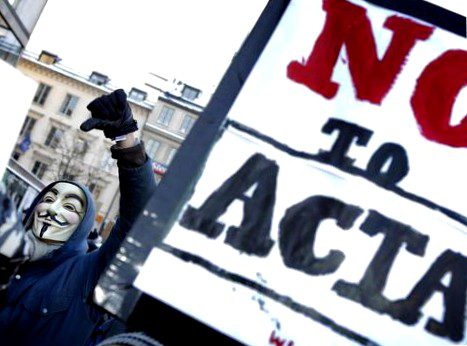Acta agreement brings net community to barricades

But now the opponents are mobilizing for demonstrations on saturday. They see ACTA as a threat to internet freedom. Supporters say ACTA is important to curb copyright infringements.
This is how section 5 of the treaty deals with the "enforcement of intellectual property rights in the digital environment". Each signatory state must ensure effective law enforcement and deterrence in its own jurisdiction. Internet providers should print out data such as IP addresses, which can be used to identify people in the event of death. Copyright holders can then assert their claims legally. Measures are also to be taken against the circumvention of copy protection techniques.
The 37 countries that have agreed to the agreement include the 27 EU member states, switzerland, the USA and japan. Germany had not yet signed ACTA on tuesday for formal reasons – but according to information from the foreign office, this is to be made up for shortly. In poland and the czech republic, on the other hand, ratification of the treaty has been suspended for the time being following fierce protests. "Under no circumstances can we allow civil liberties and free access to information to be threatened in any way," declared czech minister-president petr necas on monday.
Such concerns are not shared in the federal government. No call to change the current legal situation in any direction can be derived from the agreement, emphasizes federal justice minister sabine leutheusser-schnarrenberger (FDP).
Thomas stadler, a specialist lawyer in freising who specializes in IT law, agrees: "if you look at the ACTA text, you’ll find almost nothing there that isn’t already law in germany."The current discussion is often conducted in an unobjective manner. But there are good reasons to be against ACTA. ACTA thus cements "a decision on copyright law that favors rights holders unilaterally and takes little account of the common good". What is needed is a fair balance of interests.
In an interim report, the federal parliament’s internet inquiry commission also stresses "that copyright law definitely needs systematic adjustment in many places in order to maintain an appropriate regulatory framework for intangible good in the digital society". In addition to the justified claims of the copyright holders, "the general interest in the demand for creativity, innovation and the advancement of knowledge must also be taken into account". Because the interests of the publishing, film and music industries on the one hand and internet users on the other are so far apart, a reform of copyright law that could do justice to both sides seems a long way off.
"Effective protection of intellectual property also means being able to enforce the law," says doris moller, head of the intellectual property department at the german chamber of industry and commerce (DIHK), adding: "otherwise it is worth nothing."ACTA is also about the protection of industrial patents: "innovation is demanded when things are researched and patentable results are created. If they are not protected then we have a problem."
ACTA opponents like the grunen, on the other hand, feel "the air of repression and not of new, alternative causes," as stated in a resolution passed by the federal executive board on monday – with the headline: "bringing ACTA down!"The opponents are flouted by the protest movement in the USA, which succeeded in january in putting the copyright initiatives SOPA and PIPA on ice for the time being.
Net activist markus beckedahl, chairman of the digital society association and a member of the bundestag’s internet inquiry, sees a problem in the general and vague wording of the ACTA text. "When it comes to different interpretations, the question is: does the pendulum swing towards freedom of speech or towards the protection of intellectual monopoly rights??"
This is how beckedahl plans to hit the streets in berlin on saturday, when europe-wide protests against ACTA will be called for. In germany alone, demonstrations are planned in 54 cities – from aachen to chemnitz, minden and rostock to wurzburg. Among the organizers is also the pirate party, whose chairman sebastian nerz criticizes: "ACTA is another step in the wrong direction. The agreement adheres to ideas of an outdated copyright law."
